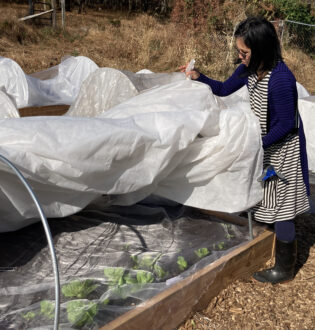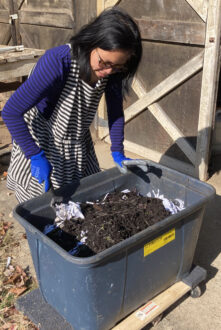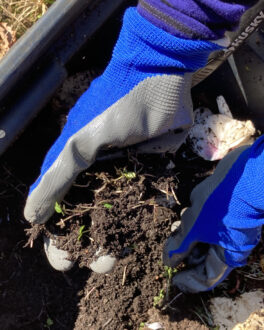LEESBURG, Virginia – With the rising costs of fertilizers, farmers are seeking alternative options to supplement soil health for crops. One microgreens farmer in Virginia is testing the validity of aerated compost tea as a viable option for small-scale vegetable growers, especially for those who wish to pursue organic production practices.
In a two-year Southern Sustainable Agriculture Research and Education (SSARE) Producer Grant, Nicky Schauder, of Permaculture Gardens, is testing the effects of weekly aerated compost tea on production yield of swiss chard, lettuce and kale.
“The goal is to show that aerated compost tea can result in the same or improved yields as commercial fertilizer applications,” said Schauder. “The result would be a sustainable solution that can be used to improve crop fertility and increase nutrient density, while lowering input costs.”

Compost tea, the liquid extracted from compost by suspending the solid in potable water for a period of time, has long been used to boost soil nutrients, act as a fertilizer, and even fight off plant diseases. But whether compost tea consistently works and works well are still big question marks – no two compost teas are alike and various compost tea methods can produce different results, or potentially create harmful bacteria that can cause illness.
In the Southern SARE Producer Grant project, Schauder is focusing on aerated compost tea using vermiculture as the compost base. Aerated compost tea is brewed using air bubbles to oxygenate the water during the brew process. Trace amounts of bacterial food is added to the water, cultivating beneficial aerobic microorganisms.
By comparison, non-aerated compost tea is made by mixing compost, water and other ingredients and allowing it to ferment for a period of time undisturbed.

“One of the challenges in making compost tea is creating a product that suppresses harmful bacteria and encourages beneficial bacteria,” said Schauder. “In my study, I found that the literature holds true: Feeding molasses as bacterial food spikes harmful bacteria because of the sugars, and feeding humic acid and fish hydrolysis better supported more beneficial microorganisms.”
In the project, Schauder demonstrates the process for making aerated compost tea using vermicompost and inexpensive materials, such as a 5-gallon bucket and a 200-watt pump and hose. Once the compost tea has been brewed, she sprays it on a trial plot of kale, lettuce and Swiss chard, comparing the performance of the plants to commercial fertilizer and the control of no fertilizer. Once the research is complete, Schauder will measure the effectiveness of compost tea compared to commercial fertilizers on plant health by measuring the diameter crown width of the plants, as well as calculating yields.
“If proven viable, aerated compost tea could yield similar or better crop fertility, growth, and yield. This would mean better or comparable results without the detrimental effects of chemicals in our soils and food,” said Schauder.
Details of the SSARE Producer Grant project can be found on Schauder’s website at https://www.permaculturegardens.org/compost-tea-research
